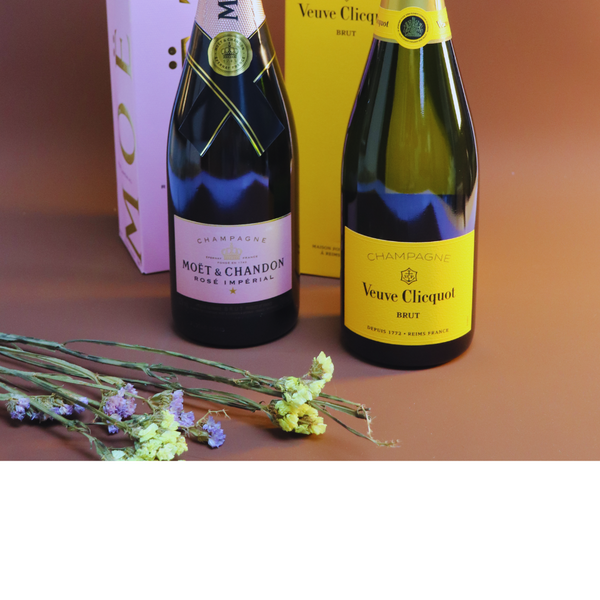Moët & Chandon vs Veuve Clicquot : The Household Champagne Battle
May 09, 2025
For centuries, Moët & Chandon and Veuve Clicquot are one of the, if not most, famous household names in the champagne world. They are ubiquitous, in the supermarkets, wine shops, bars, restaurants, clubs, you name it. They share a lot in common (under the same ownership of LVMH), yet different in many extraordinary ways.
Moët & Chandon: The Household Name
Founded in 1743 by Claude Moët, it has become synonymous with luxury, celebration, and excellence in winemaking. Based in Épernay, France, in the heart of the Champagne region, it owns 1,190 hectares (2,900 acres) of vineyards, and annually produces approximately 28,000,000 bottles of champagne.
Their famous slogan is "Be Fabulous"—reflecting its glamorous and celebratory image. Napoleon was a loyal customer and reportedly said, "In victory, you deserve champagne; in defeat, you need it. In modern days, Moët is a staple at high-profile events like the Oscars, Grand Prix, and celebrity parties.
Moët & Chandon’s winemaking techniques combine traditional Champagne methods with modern innovation, ensuring consistency, quality, and the signature elegance. Primary fermentation in temperature-controlled stainless steel tanks to preserve freshness. Reserve wines: Moët keeps a library of reserve wines (up to 10+ years old) to blend with new vintages for consistency.
Moët champagnes are known for their lush fruitiness (apple, peach, citrus), creamy mousse, and lively acidity—crafted for immediate drinkability yet capable of aging.
Veuve Clicquot: The Yellow Label
Veuve Clicquot is one of the most iconic and revered Champagne houses in the world, renowned for its rich history, bold flavors, and pioneering spirit. Founded in 1772 in Reims, France, it became legendary under the leadership of Madame Barbe-Nicole Clicquot Ponsardin (the "Veuve" or "Widow" Clicquot), who revolutionized Champagne production in the early 19th century.
Veuve Clicquot invented the riddling table (remuage) in 1816, a technique to clarify Champagne by removing sediment—still used today, and pioneered the first recorded vintage Champagne (1810) and rosé Champagne (blending method, 1818).
Veuve Clicquot are different from Moët in many wine-making ways. First, they are Pinot Noir-driven, grown primarily in Grand Cru vineyards (Aÿ, Bouzy, Verzenay). Besides, they perform extended aging on lees: Yellow Label ages 3+ years (beyond legal minimum); vintages age 5+ years. Partial fermentation in neutral oak is conducted for texture (rare for non-vintage Champagnes). And it finishes with a distinctive Clicquot Taste: Bold, structured, with signature toasted brioche notes from autolysis.
Summary
| Moët & Chandon | Veuve Clicquot | |
| Founded | 1743 | 1772 |
| Location | Épernay | Reims |
| Current Owner | LVMH | LVMH |
| Vineyards | 1200 hectares | 390 hectares |
| Annual Production | 30 million bottles | 18 million bottles |
| Production | Blend of three varietals | Blend, with a Pinot Noir-focus |
| House Style | Fruity, vibrant, and balanced | Full-bodied, structured, and toasty |
| Fermentation | Stainless Steel | Partially in Oak |
| Entry Cuvées | Imperial | Yellow Label |
| Prestige Cuvées | Collection Impériale Création N°1 | La Grande Dame |










